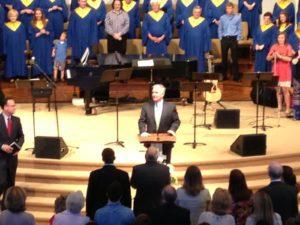Midweek Message: Gifted, Session 5 (Recorded live in the Great Room on September 18, 2013). Unity in Diversity: Teaching on 1 Corinthians 12
Click here to listen or download: 2013.09.18.GiftedMidweekSession5.CharlesMoore.
Midweek Message: Gifted, Session 5 (Recorded live in the Great Room on September 18, 2013). Unity in Diversity: Teaching on 1 Corinthians 12
Click here to listen or download: 2013.09.18.GiftedMidweekSession5.CharlesMoore.
For many among us this is the best time of the year not because of the promise of changing leaves, but because of the promise (O.K., hope) of touchdowns. It’s football season.
Much has been made recently of the violence of the game. I suppose that we could argue that concern one way or the other, but I doubt that our debate would drastically alter anyone’s love of the sport. Rodney Clapp writes in The Christian Century: “I’ll keep watching football not because of the game’s violence, but because of its instances of (barely) avoided violence. That’s what gives the game its beauty and its thrills.” Almost everyone reading this knows something of the thrill of a Friday night football game.

All the men on our pastoral staff have their NFL favorites, but I’m descended on my father’s side from a long line of die-hard Texas Aggies – for whom no game beyond the college level can ever satisfy like the maroon-and-white, over-the-top extravaganza that is a football game at Kyle Field. Those A&M military traditions are forever imbedded in my psyche, including all the songs and “yells” that make the environment electric with enthusiasm – and that regardless of the outcome. As my grandmother used to say after every loss: “We won the band.” Joshua and I went to the Cotton Bowl in Arlington last January, where the Aggies trounced Oklahoma, and were seated right behind Johnny Football’s grandma (photos from my phone included). More fun than anyone should be allowed to have in a single night.
What makes such a moment so memorable? It may well be, in large measure, the solidarity of both purpose and resolve.
In the days of the Roman Empire, a young commander of a “special forces” unit – Camidus was his name – met Jesus Christ and found his heart and life forever changed. The men in the unit were known as the Thundering Legion, and were greatly distinguished on the battlefield. Camidus shared his faith with his regiment, and all of the thirty-nine men under his command trusted Christ for salvation. This, as you might imagine, did not sit well with the Roman governor. When the men in the regiment would not turn from Christ and worship the idols of the Empire, all forty soldiers were stripped naked and marched out onto a frozen lake, and tied together with a rope to be left to freeze to death. The rope was tied loosely, so that any man could change his mind, renounce his faith, and be treated to a steaming hot bath where he could recover.
The stunned guard overseeing all of this heard the prisoners chanting: “Forty soldiers, we stand strong in the strength of Christ and Christ alone.” Long into the night the men chanted, until one man weakened and abandoned his loyalty to Jesus. He stumbled toward the warmth of the Roman bath. But the guard could still hear the sounds of those who were left suffering, only slightly amended: “Thirty-nine soldiers, we stand strong in the strength of Christ and Christ alone.”
To the guard’s amazement, the chant actually grew louder and stronger. How could this be?
And as you might also imagine, our Sovereign Lord used the moment to convert the guard. Something only Jesus could do. The man stripped off his clothes and joined the others, shouting “I am a Christian!” And louder than ever the chorus rang out: “Forty soldiers, we stand strong in the strength of Christ and Christ alone.”
By morning’s light all forty men were dead.
In My Heart’s Cry, Anne Graham Lotz rightly observes: “In our God-blessed nation of America … no one is crucified or thrown to the lions or burned at the stake because he or she believes in Jesus as the only way to God. Yet the average church member seems to lack deep convictions concerning who Jesus is to the extent he or she cowers under a raised eyebrow, or a whispered innuendo, or a politically incorrect label.”
Maybe we enjoy football because of the purpose and resolve that we admire in others but all too often don’t see in ourselves. My beloved brothers and sisters, we have been known and loved by One who is far more worthy of our passion and allegiance than a pigskin. Perhaps our solidarity will come when we lock arms for Christ’s gospel, and march out into the world as one body “full of grace and truth.”
Midweek Message: Gifted, Session 4 (Recorded live in the Great Room on September 11, 2013)
Click here to listen or download: 2013.09.11.GiftedMidweekSession4.CharlesMoore
“The steadfast love of the Lord never ceases;
His mercies never come to an end.
They are new every morning, new every morning:
Great is Thy faithfulness, O Lord – great is Thy faithfulness!”
Edith McNeill set those words to music in 1974 as a reflection of the truths contained in Lamentations 3:22-23. In that passage Jeremiah offers his own experience of God’s goodness as encouragement for God’s people to find hope even in very difficult times. Timeless indeed.
Many of us who remember when Mrs. McNeill’s Scripture song was new (or nearly new) have sung it (at least in our minds) at a dark moment when we really needed to be reminded of the faithfulness of God. (We thought it was “contemporary” – imagine that!) Maybe we were going through a long trial, or a protracted spiritual battle, that had robbed us of sound sleep many nights in a row. As long as the trial lasted, a new day meant a new reminder that the battle wasn’t over – and we were tired because rest was hard to find – but the morning light also meant a renewed hope in the goodness and provision of the Lord. There’s something about a new day that brings at least a little new strength.
Eileen and I walked through more than one failed adoption, and I can remember such heaviness of heart that the knowledge of God’s grace became the only life ring in the sea of sadness that seemed to surround us. But God was faithful. As He always is. We look back now on those chapters in our lives as seasons of needed growth in absolute reliance upon our Lord and Savior. We needed to know that His plan was perfect, no matter how we felt at the time. We needed to know that Christ is enough. I’ve lived half a century now, and I can tell you that Christ is enough. (Please remind me tomorrow, though, as I’m not immune to spiritual amnesia.)

A week ago today I enjoyed the amazing privilege of celebrating the 100th birthday of one of our beloved church members, Jimmie Mahoney. Jimmie looked gorgeous all decked out in her bright pink outfit, complete with shiny tiara. Her regal attire made her dazzle with the sophistication of a member of the royal family. And why shouldn’t she look like a queen? You don’t turn 100 every day.
As I thought about Jimmie’s life, I thought about all the history that she has personally observed over the last century. All the American Presidents she could tell us about. All of the personal joys and all of the personal sorrows, rolled into one beautiful life. I thought about the faithfulness of God to her all those years. His stubborn love for her. His relentless gifts of just what she needed, at every point along the way. That’s quite a track record of faithfulness, isn’t it?
But then, again, that’s the Lord’s faithful record in your life too. And in mine. He’s never made a mistake. Not one. Even those things we couldn’t figure out or accept – maybe we still can’t – were all part of a good and gracious plan that He was orchestrating on our behalf (Romans 8:28; Ephesians 1:11).
And so we choose to trust Him now. For today, and even for tomorrow (Proverbs 3:5-6). Not many of us will celebrate a 100th birthday. But whether we do or don’t, the same faithful God who cares for Jimmie is all we need.
And when we leave this earth, we’ll see with perfect vision how God’s faithfulness was with us every step of the way. “But this I call to mind, and therefore I have hope” (Lamentations 3:21).
Happy Birthday to you!
Happy Birthday to you!
Happy Birthday, Dear Jimmie!
Happy Birthday to you!
I’m really enjoying our Sunday evening journey through Jonah. Last night I mentioned the simplicity of the message that Jonah took (finally!) to the Ninevites – the message that the Lord used to bring the Ninevites to repentance. I tried to make a strong case for Biblical preaching: that people simply need God’s Word clearly delivered.
So I thought that today’s blog might be a great opportunity for me to explain why I’m committed to what is called expository, or expositional, preaching. In a nutshell, expository preaching has a goal, and that goal is simply to expose (thus, “expos-itional”) the meaning of the passage that is preached. A passage may have multiple applications, but it has only one meaning: the meaning that God intended when He wrote it. That’s what we’re after in expositional preaching.

It is my opinion that expository preaching is the type of preaching that best places the truth of God’s Word front and center for God’s people. It emphasizes the centrality and authority of preaching as the heart of congregational worship. Said more succinctly, it is the kind of preaching – in my opinion – that best creates a sense of reverent expectation among its hearers THAT GOD WILL SPEAK through the message that is proclaimed.
You may wonder why I read the passage in its entirety at the onset of my preaching. (And there are other good ways to do it, I freely admit.) But the reason that I start with the text just as God has written it is this: That’s the most important Word that will be heard during the sermon! That’s the Word without my opinion. That’s the Word without my having made a single judgment call about what to emphasize or draw out. I may make a mess of the sermon (though I try not to make a habit of that), but I know that God’s Word can do great things with or without me.
Now I understand that we live in an age when authority of any kind is challenged, and when authoritative truth claims are mocked and marginalized. But instead of retreating, ashamed of our Bibles, within that context, I believe that now is the time for Christ’s Church to sound a clarion call for people to believe in the absolute authority of God’s Word. Maybe we’ll see some surprising things happen, not unlike what God did among the Ninevites. But regardless of the outcome, I’m convinced that it’s right for us to stay the course in terms of Biblical fidelity.
Please allow me to share with you why I generally prefer to work though books of the Bible instead of bouncing around the Bible in the choice of sermon texts. And please understand that I’m not saying that a topical sermon can’t be expositional: it absolutely can. A topical sermon, and I preach them from time to time, can be solidly grounded in uncovering the meaning of a passage or passages of Scripture. But I most often choose to work through larger portions of the Bible (broken down into manageable segments) for some specific reasons that I’d like to share with you if you will indulge me:
In all of the history of the church, there has never been a real revival or a true spiritual awakening – resulting in lives indelibly changed – that was not marked by serious preaching. Authoritative preaching. “Thus saith the Lord.” Without the Scriptures, and what they really mean, the preacher has nothing to contribute of lasting value. Nothing. And when there’s no real reverence for the Word, there’s no real worship.
My job is to present a truth revealed, not a message invented. So to that end I give much of my time, energy, and prayer. I understand that First Baptist Church is unlikely to be any more excited about the Bible than I am, so I go to bed and I wake up thinking about how I must discharge that responsibility with all my heart.
John S. Dickerson has written a book titled “The Great Evangelical Recession: 6 Factors That Will Crash the American Church … and How to Prepare.” Mr. Dickerson has written for The New York Times, The Washington Post, CNN, and others. In 2008 Tom Brokaw, Charles Gibson (ABC News) and Anna Quindlen (Newsweek) named Dickerson’s investigative reporting the best in the nation. Here are Dickerson’s alarm bells regarding today’s church (and I might add, that’s the professing Christ-honoring and Bible-believing church): over-inflated numbers and influence, the reality of a post-Christian culture, division, financial strain, the inability to keep young people in the church, and ineffectiveness at making new disciples. All present realities in most congregations.
Do we surrender? No way! We press on. We press on with Biblical preaching. We press on with truth preached with grace (John 1:14). Truth that changes lives, marriages, families, churches, cultures, and nations for the glory of our great God.
We’ve heard people refer to “do-gooders” in a pejorative sense: “That Jane Doe is nothing but a do-gooder all over town.” Meaning by that, Ms. Doe is so dumb that she thinks she’s accomplishing something of value in the community when in actuality she is not.
Exactly what is a do-gooder?
One dictionary defines “do-gooder” like this: “A naïve idealist who supports philanthropic or humanitarian causes or
reforms.” Naïve being the key word.
Another dictionary: “An earnest often naïve humanitarian.” Again, naïve.
Another like this: “An earnest but often naïve person (typically educated and white) who wants reform through philanthropic or egalitarian means. e.g. wealth redistribution, social justice, welfare, third world immigration, adoption of ‘disadvantaged’ children (usually non-white and from abroad), affirmative action and spending other peoples’ money for good causes.” A provocative definition, for sure, but I don’t think it would have passed muster with my fourth grade teacher, Mrs. Lockwood, who taught us how to write a correct definition.
Another definition of “do-gooder” I found: “Person who has a large object permanently inserted inside the ends of their world. Due to such object, they become blurred to the realities of life, and therefore, feel the need to push their own agenda regardless of whether that agenda appears to be relevant, important and true to the rest of the sane world.”
Ouch. I’m sorry I asked.
But the Bible weighs in on this too, and just in time.
“And let us not grow weary of doing good, for in due season we will reap, if we do not give up” (Galatians 6:9).
“And let us consider how to stir up one another to love and good works” (Hebrews 10:24).
“So whoever knows the right thing to do and fails to do it, for him it is sin” (James 4:17).
Proverbs 3:27 grabs our attention with gusto: “Do not withhold good from those to whom it is due, when it is in your power to do it.” That’s not much like a suggestion, but it’s more like a strong admonition. It’s a tall order. It ain’t no fooling around. (Sorry, Mrs. Lockwood, in case you’re reading from heaven.)
And how about Acts 10:38? Jesus Christ, our Lord and Savior, “went about doing good …” Hmmm. I would think that a Christ-follower ought to do the same.
John Wesley said it like this:
“Do all the good you can.
In all the ways you can.
In all the places you can.
At all the times you can.
To all the people you can.
As long as you ever can.”
Can our good deeds save us? Not a chance. “For by grace you have been saved through faith. And this is not your own doing; it is the gift of God, not a result of works, so that no one may boast (Ephesians 2:8-9). But there is that next verse! “For we are his workmanship, created in Christ Jesus for good works, which God prepared beforehand, that we should walk in them” (2:10). Our good works can’t save us – thankfully, Christ’s good work on the cross did that. But our good works do shine the spotlight on our Savior, and give stirring testimony to the fact that He has graciously passed our way.
O.K., so I won’t ask you to be a do-gooder, unless you can interpret that term in the most positive light.
But please do good. (That’s not bad grammar, Mrs. Lockwood. I meant to word it like that. And thanks for being a phenomenal teacher.)
I’m not sure we’re called to do well, but I do think we’re called to do good.
Midweek Message: Gifted, Session 3 (Recorded live in the Great Room on September 04, 2013)
Click here to listen or download: 2013.09.04.GiftedMidweekSeries.Session3.CharlesMoore
We naturally admire people who persevere. I always think of Eric Liddell, who faced so many medical complications as a child that some thought he would never walk again. But Liddell grew up to become “the Flying Scotsman” and the winner of the men’s 400 meters at the 1924 Summer Olympics in Paris. When Eric declined to race on the Lord’s Day, he was berated by the press and popularly mocked for his convictions. Most critics became fans, however, after Eric won the gold for Scotland. Eric Liddell became a missionary, and died at the Weihsien Internment Camp in China. His life exemplifies for us uncompromising service for Christ against a steady stream of obstacles and opposition.

If we truly serve Christ, we can expect our share of difficulties along the way. Sometimes these trials are predictable – at other times it seems there’s neither rhyme nor reason why great struggles come our way.
John 8 records a time when Jesus was teaching in the temple area during and after the Tabernacles festival. Jesus announced some tough truths in that environment: truths about life and death, sin and salvation, heaven and hell. As you might imagine, for many who heard what Jesus said, it did not go over well.
As a matter of fact, there was so much opposition against our Lord by the conclusion of the events recorded in that chapter that some among the angry mob even attempted to stone Him. Jesus left the temple area, but continued His ministry of teaching and healing – the mission to make God known for which He had come into the world. Christ would not be dissuaded from His objective “to seek and to save the lost” (Luke 19:10).
Some treatment for the Light of the world.
You and I must expect some of that same treatment in our journey with Christ. He loves us so much that He calls us to share in the things that draw us closer to Him. And those storms of life can leave us feeling depleted, wrung out, and just plain exhausted (physically, mentally, emotionally, and spiritually).
But here’s the amazing part: our weakness ends up being Christ’s strength! The Apostle Paul wanted that miserable thorn – whatever it was (and I’m kind of glad we don’t know for sure, so that we can relate it to our own) removed from his path, but God had a better plan (Second Corinthians 12:7-10). The thorn would stay, and Paul would learn Christ’s grace through “weaknesses, insults, hardships, persecutions, and calamities.” Sometimes in the form of an avalanche of all of the above.
Not exactly what we would sign up for, but all part of God’s plan to teach us the power of perseverance. As we perceive more and more of our own weakness, we learn to appropriate more and more of Christ’s power. We learn that perseverance is more than holding on to Jesus – as important as that is – as we discover that He is the One who is holding on to us.
Back to John’s Gospel, in regard to Jesus in that same account, John also records (8:20): “No one arrested him, because his hour had not yet come.” You and I can take comfort in God’s providential care of us in every stormy trial we face. There is nothing touching us but that which God purposes for our good and for His glory. So breathe deeply. All is well.
“As he was saying these things, many believed in him” (John 8:30). O Lord, I want to be in that number.
 The older I get, the more I recognize the pervasive loneliness that resides within the souls of most people whom I meet. It’s not that they’re cut off from all human contact, but it’s actually worse than that. They’re alone even when others are around. There is little about their relationships that inspires or delights them. They can converse, but they’re still disconnected. It’s a loneliness that haunts them at the core of who they are, and a loneliness that occludes their vision of the world.
The older I get, the more I recognize the pervasive loneliness that resides within the souls of most people whom I meet. It’s not that they’re cut off from all human contact, but it’s actually worse than that. They’re alone even when others are around. There is little about their relationships that inspires or delights them. They can converse, but they’re still disconnected. It’s a loneliness that haunts them at the core of who they are, and a loneliness that occludes their vision of the world.
Since God created us for relationship, we know that loneliness is less than what we were made to experience. Sometimes we’re lonely because we’ve chosen to detach ourselves from other people (at least from any meaningful interaction with them) – and this is usually because we’ve been deeply hurt and don’t want to be hurt again. We mistakenly conclude that the secret to protecting ourselves from relational pain is to avoid the risk of entering into any real relationships. What we don’t realize when we do that, however, is that we’re self-inflicting a wound far deeper than the one we’re seeking to avoid.
Thankfully, the Bible offers a way out of our loneliness, and that’s an intimate, life-giving, heart-satisfying relationship with the living God!
As Matthew the tax collector turned gospel writer describes the birth of Jesus Christ, he records these words (1:22-23): “All this took place to fulfill what the Lord had spoken by the prophet: ‘Behold, the virgin shall conceive and bear a son, and they shall call his name Immanuel’ (which means, GOD WITH US).”
God with us. That’s the secret. If we really believe that, we can launch out into the sometimes scary waters of human relationships. Because we’re not alone. We’re never alone. So if a relationship doesn’t “work out” according to my assessment, I’m still not alone. The real “me” does not hinge upon the value placed on me by any other person, because my real value was settled at the cross.
Perhaps the “best part” of the first resurrection appearance of Jesus – recorded in John 20:17 – is Christ’s announcement that He was ascending “to my Father and your Father, to my God and your God.” Have you ever thought about that? Jesus is telling every Christian believer something marvelous there, namely, that we are children of God! Adopted into God’s own family, with all the rights and responsibilities that such entails.
As our Father’s adopted children, we know that our Father is in control. We fear him, but not in a terrorizing sense. Our fear of God is respect and awe. And nothing makes a child feel safer than knowing that he or she is secure in the care of a loving parent. Our closeness to God is the relational connection that becomes the impetus to pursue closeness with others. Yes, like Jesus, we will get hurt by others in this world – even by some of those we love. But we, also like Jesus, keep extending ourselves in gracious openness toward others. Because that’s who we are in Christ. And, since our soul is content in the unshakeable foundation of our love relationship with our Heavenly Father, we have a never-ending refuge when we need one (Psalm 46).
In Christ our God we find affection that’s true, fellowship that’s real, and self-identity based on fact instead of fiction. And from that place we can love others, because Jesus first loved us (First John 4:19).
So go out on a limb, and love. You were made to love. Loneliness, get lost! Love is here to stay.
Midweek Message: Gifted, Session 2 (Recorded live in the Great Room on August 28, 2013)
Click here to listen or download: 2013.08.28.GiftedMidweekSeries.Session2.CharlesMoore
Recent Comments